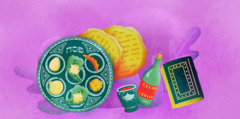Pesach Mitzrayim and Pesach Dorot- The Egyptian Passover and the Passover of the Generations
03/12/2023 08:50:41 PM

Passover is the story-telling holiday disguised as a meal. We love to kvetch about the dry, crackly Matzah but this most quintessential of all Jewish foods has a subtle nutty, homey flavor that deep down, tugs at our heartstrings.
We gather together on the night of 14 Nisan, which this year falls out on April 5th (Wednesday night) for our Seders. Seder means “Order” and is pluralized in our Ashkenazic Hebrew as S’darim with the accent on the “dar”. Here in the diaspora we also hold a second Seder on the following night.
So, what’s it all about? It was this very night, according to the Torah, when we were liberated from slavery in Egypt. On that night, plague stalked the darkness killing the firstborn of Egypt, but passing over the doors of Israel.
Take a lamb for each household… and slaughter it at twilight…Use hyssop fronds to smear blood upon your doorposts and lintel…when I see the blood, I will pass over you and the destroyer shall not come upon you when I smite the land of Egypt. (Exodus 12:10-12)
Over and over again Pharaoh and Egypt were warned to release us. Moses’ first message to Pharaoh, delivered a whole year earlier was a stark adjuration: Israel is my firstborn. Release my firstborn or I will smite your firstborn. (Exodus 4:23). The ancient Rabbis made a distinction between the first Passover, Pesach Mitzrayim, the Passover of Egypt, and Pesach Dorot, the Passover of Later Generations.
The Egyptian Passover was a “night of watchfulness”, a night of fear. Eat the roasted lamb sacrifice quickly, with unleavened bread and bitter herbs, your shoes on your feet, your staff in your hands, wearing your traveling cloaks, for tonight you are free. (Exodus 12:8-11)
But the Passover of the Generations, our Passover, is different. Rather than a night of joy fighting with dread, it is a night of gratitude and remembrance, a night of gathering together, a night of telling the story, of questions and answers, of rituals and songs, characters like the four children, ancient Rabbis discussing the Exodus through the night, and Rabban Gamliel who told us that in every generation we should think of ourselves as being redeemed from slavery and so many others. And all in the wine-stained pages of the Haggada, the table-book of Pesach.
And then there’s the new material. The song parodies, the child-friendly Seder, the one-hour Seder, the fifteen-minute Seder, the plastic frogs and Passover bingo sets and additional items placed on the Seder plate to keep the ancient practices relevant and accessible to the shortened attention spans of recent generations. I remember the twenty-something that sat next to me at a Seder a few years back with his cell phone placed clandestinely next to him below table level, his gaze unwaveringly glued to the small screen. What does the Seder have to offer his generation that can compete with the LOL’s and Instagram posts?
Finally, there’s that one filled wine glass that sits on the Seder Plate. The wine glass that we don’t drink from. Elijah’s cup we call it, named for the ancient Prophet who rose to heaven in a chariot of fire and who will return we are told to announce the coming of the Messiah. That cup is a reminder that the story isn’t over. The redemption saga that began on that spring night in Nisan in Egypt continues in ways both revealed and hidden; next year in Jerusalem we sing, concluding the Seder but not the story.
Matzah is called the “Bread of Telling”. What stories will we tell and what memories will our Seders evoke and create? What hopes and dreams will we awaken and what future acts of compassion, renewal and hope will we inspire?
This year, perhaps some of the anxiety of the first Passover, Pesach Mitzrayim, the Egyptian Passover, will haunt our celebrations of Pesach Dorot, the Passover of the Generations. The divisions in our country and our world continue to deepen. Israel faces an unprecedented crisis that threatens the unity that the world’s only Jewish state needs to survive.
The very first ritual of the Seder is to throw open the door, hold up the Matzah and invite others to join us. I invite you to make this action the emblem of our Seders this year. In a time of division everywhere, particularly in our country and in Israel, let us make our Seders a place of inclusion and welcome, where the focus is on each guest’s experience of the story and the experience. In every miraculous redemption of the Jewish people, from the Exodus to our day, the miracle is always, always preceded by an act of coming together.
Maybe it was not the Exodus that created the Seder. Maybe it was that first act of coming together, family by family, community by community that created the Exodus. Let us celebrate Pesach like that: with the faith that our Seder itself is an act of redemption. We have a month to prepare - whether you are a host or a guest, let's all prepare something special this Passover!
Shabbat Shalom
